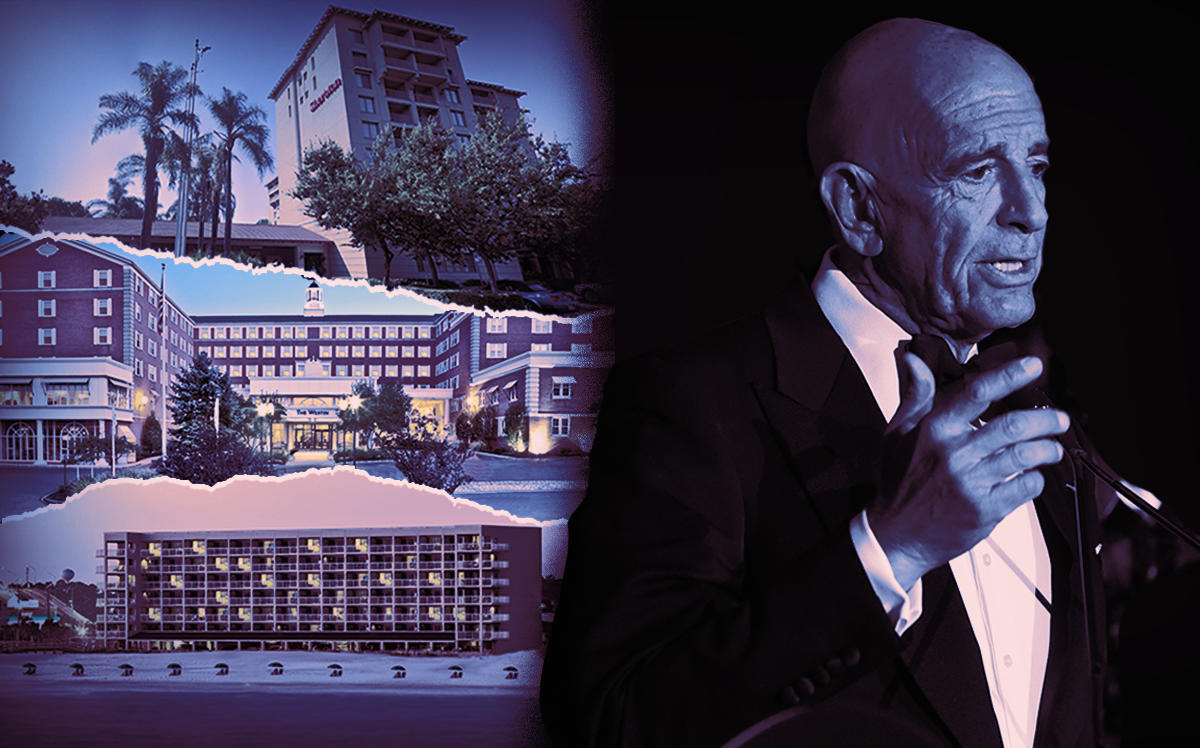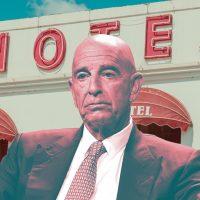
Thomas Barrack and (from top) Sheraton San Jose Hotel in Milpitas, CA; The Westin Governor Morris in Morristown, NJ; Four Points by Sheraton Destin in Fort Walton Beach, FL (Barrack by Jared Siskin/Patrick McMullan via Getty, Google Maps, Westin, Marriott)
Tom Barrack’s Colony Capital has spent the last several years pivoting away from “legacy” real estate assets toward digital properties like cell phone towers, optic fiber networks and data centers. But the investment firm still has billions of dollars in legacy properties on its books, which have been hit hard by the coronavirus crisis.
In May, the Los Angeles-based company announced that $3.2 billion of consolidated debt in its hotel holdings — out of a total of $3.5 billion — was in default. The company was later reported to have hired investment bank Moelis & Co to evaluate alternatives for those properties.
“The company does not anticipate allocating material amounts of its own capital to these hospitality portfolios but reserves the right to participate on a limited basis alongside third-party capital,” Colony said in a May SEC filing. The note included a presentation on its hotel portfolio, a move meant to help it “explore potential transactions involving portions of the company’s hospitality borrowings.”
Colony’s presentation shows that its hospitality holdings were divided into seven portfolios with separate capital structures, the four largest of which were financed through massive single-borrower CMBS deals. The challenges facing these hotels, which include more than 29,000 rooms across 245 properties, reflect the uncertainty facing the entire sector even as some hotels have begun to slowly reopen.
“Right now there’s an enormous amount of stress on the debt side,” said Anne Lloyd-Jones, a senior managing director at the hospitality consulting firm HVS. “It’s a really bad situation from a hotel owner’s perspective because there’s no or so little money coming in, but still embedded expenses, and for many properties the debt service piece of it is the largest of all expenses on a monthly basis.”
Large CMBS deals in particular, which were a common way of raising the huge amounts of debt needed for multi-state hotel portfolio acquisitions, are emerging as a major stress point.
With a non-CMBS loan, “even if it’s with a big bank, you can pick up the phone and speak to someone and have a rational conversation,” said Eric Orenstein, an attorney at Rosenberg & Estis who specializes in hotels. But with a CMBS loan, he added, “there’s nobody to call because the servicers are bound by the servicing agreement.” Orenstein said the servicers “don’t have much leeway to make changes, and to me that’s really where the problem is going to be. And for people who have large portfolios covered by securitized loans, it’s not going to be too pretty for them.”
Read more


“Other Equity and Debt”
Colony Capital has some experience itself taking over hotel properties from borrowers. In fact, that’s how the firm got its hands on its largest hotel portfolio of all — the 89-property, 8,585-key THL (or Tharaldson) portfolio.
Originally a junior mezzanine lender on the properties, Colony took over the portfolio — which at the time included 135 hotels in 28 states — through a “consensual transfer in lieu of foreclosure” from the prior owner, Whitehall, in 2017 after Whitehall defaulted on the mezzanine debt.
Apparently because of the way in which Colony acquired this portfolio, the company reports the THL hotels under its “Other Equity and Debt” holdings, rather than as part of its “Hospitality” segment.
Colony, which owns a 55-percent stake in the portfolio alongside “certain managed investment vehicles,” refinanced the properties with a new $960 million CMBS loan the following year. About a third of the hotels in the portfolio have since been sold and released from the CMBS trust, and the remaining balance on the loan is about $778 million.
The originators of the CMBS loan, JPMorgan and Deutsche Bank, also provided $80 million in mezzanine debt for the properties, of which $64.8 million remains outstanding.
The CMBS loan, which was set to mature this November, was transferred to the special servicer and extended by 12 months, according to Trepp.
CMBS-financed hotels
Colony owns 90-percent stakes in the next two largest portfolios: the 48-hotel, 6,402-key Inland portfolio and the 46-hotel, 5,948-key Innkeepers portfolio. The minority partner in both of these portfolios is Chatham Lodging Trust, whose CEO and chairman, Jeffrey Fisher, is also the majority principal shareholder in Island Hospitality Management, which manages most of the Inland and all of the Innkeepers hotels.
The partners acquired the Inland hotels from Inland American Real Estate Trust in 2014. That same year, Colony — or NorthStar Realty Finance at the time — took over Cerberus Capital Management’s majority stake in the Innkeepers portfolio, while Chatham retained its minority interest.
The Inland portfolio was refinanced with a $780 million CMBS loan in 2017, while Innkeepers was refinanced with $755 million in CMBS debt in 2019, plus another $100 million in mezzanine debt from a group of South Korean institutions, according to rating documents.
Based on the $780 million figure, the Inland deal appears to be the loan on which Colony disclosed that it had received a notice of acceleration in May, meaning it had to pay what it owed immediately. That loan was set to mature in June but has since been extended by a year after being transferred to the special servicer.
The Innkeepers CMBS loan, meanwhile, has been watchlisted but not transferred to the special servicer, and is now more than 30 days delinquent, according to Trepp.
The fourth of Colony’s seven hotel portfolios to be financed with CMBS debt is the 30-property, 4,379-key Courtyard by Marriott portfolio, which the firm also acquired in 2014 and of which it owns 100 percent.
Barclays and Morgan Stanley provided $415 million in CMBS financing and $135 million in mezzanine debt for the properties in 2018. The CMBS debt, which was set to mature in July, has been transferred to the special servicer.
Non-CMBS hotels
Three remaining portfolios are financed with unsecuritized loans, so there is less publicly available information about the properties beyond what Colony disclosed in its presentation.
The largest of the three is the 20-hotel, 1,922-key K portfolio, financed with $162.3 million senior mortgage and $57.5 million in mezzanine debt. Colony owns 97.5 percent of the properties, most of which are in Texas and California with a handful in Louisiana and Oklahoma, while the remainder is held by several minority shareholders.
The other two portfolios are both fully owned by Colony. The nine-property, 1,007-key New England portfolio in New Hampshire and Massachusetts carries a $135.3 million senior mortgage, while the three-property, 835-key Miami Airport portfolio has a $107 million senior mortgage and $19.8 million in mezzanine debt.
Edge of the iceberg
As Colony Capital evaluates various options with regard to its legacy hotel portfolio, one thing that appears certain is that there will be no shortage of interested investors.
Even before the coronavirus crisis, a number of debt funds had been established in anticipation of an expected wave of CMBS maturities in the hospitality sector this year, said HVS’ Lloyd-Jones, noting that a bit over half of all CMBS maturities expected in 2020 were for hotel properties. And the current crisis has created even more interest in distressed assets.
“We’re not hearing about any transactions yet, because right now there’s a significant enough gap between a buyer’s bid and a seller’s ask that nobody’s really meeting in the middle, and I think part of the issue is that nobody really knows what the middle is,” she noted, pointing to uncertainty around how quickly travel would recover, the possibility of a second wave of infections, as well as broader economic disruption.
While sellers are currently willing to offer discounts in the 10 to 15 percent range, buyers are largely looking for 30 to 40 percent price cuts, she said.
“There’s a lot of penguins on the edge of the iceberg and they all want to go swimming, but nobody wants to go first,” she said, adding that once a few deals break through the uncertainty, “There’s no question in my mind that many deals will be done.”
Rosenberg & Estis’ Orenstein, who represents many lenders and potential providers of “rescue capital,” noted that many hotel owners are looking for preferred equity structures to maintain control of their properties after the coronavirus crisis subsides.
“The problem with these projects is that you have people who were successful operators just trying to bring in a cash infusion, but the dynamic is like this: I have the cash that you need, but you don’t want to give me any of the rights that would be associated with my cash because you’re thinking this is just rescue capital and hoping that I’ll be out in a year,” he said.
Some owners will fight harder than others to hold onto their properties, Lloyd-Jones observed. “It all depends not just on the owner’s resources, but also appetite for riding out the cycle,” she said.
In Colony Capital’s case, the firm’s public statements and strategic outlook in recent years indicate that its appetite for staying in the hotel space is not all that great.
